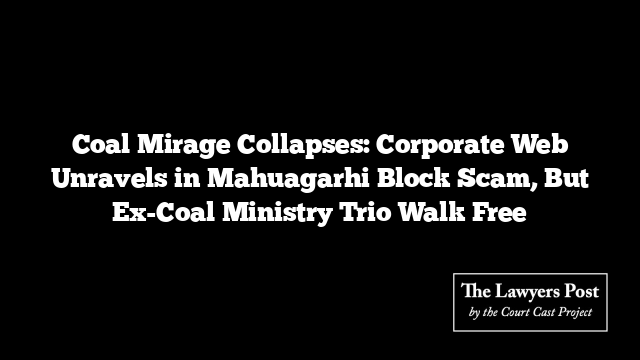A tangled tale of deceit and paperwork acrobatics finally met its reckoning in a Delhi courtroom, where Jas Infrastructure Capital Pvt Ltd (JICPL) and its director Manoj Kumar Jayaswal were found guilty of orchestrating a complex ruse to win coal block rights—while three former top government officials walked away without a scratch.
The saga dates back to the 2006–2007 coal block bonanza, when the Ministry of Coal opened up 38 blocks, 15 of them earmarked for the power sector. Among them was the Mahuagarhi coal block in Jharkhand—a prize JICPL bagged by dressing up financial fiction as fact and bending geography to suit its script.
In a judgment handed down on June 6, Special CBI Judge Sanjay Bansal acquitted former Coal Secretary HC Gupta, former Joint Secretary KS Kropha, and then Director KC Samria. The court found no evidence of dishonest intent or personal gain on their part, asserting that the officials had operated within administrative bounds and the consensus-based Screening Committee process.
But JICPL and Jayaswal weren’t so lucky.
The court exposed a calculated effort by the company to inflate its financial profile. Despite having a net worth of just ₹1 lakh, JICPL claimed strength by illegally borrowing the financials of heavyweights like IL&FS and Inertia Iron & Steel Industries—entities with no formal link to the company. JICPL also misrepresented its status as a Special Purpose Vehicle and misled authorities on its proposed end-use project location, switching between West Bengal and Bihar without proper filings.
Even more damning: the company concealed prior coal block allocations to its sister firms in the Abhijeet Group, all of which had dismal development track records. It fabricated claims of project appraisal by IL&FS and debt syndication to the tune of ₹4,445 crore—despite lacking even a completed project report.
The Central Vigilance Commission had initially referred the case to the CBI, which filed closure reports in 2014, citing insufficient evidence. But the court wasn’t buying it. A previous judge rejected the closure plea, flagged signs of criminal conspiracy, and pressed ahead with prosecution—eventually leading to the current convictions.
Judge Bansal summed it up in no uncertain terms: “Both A-1 [JICPL] and A-2 [Jayaswal] are held responsible for making misrepresentations… and dishonestly inducing the Screening Committee, Ministry of Coal, and Government of India to allocate the Mahuagarhi Coal Block.”
The court convicted JICPL and Jayaswal under Sections 420 (cheating and dishonestly inducing delivery of property) and 120-B read with 420 (criminal conspiracy) of the Indian Penal Code.
Meanwhile, the court emphasized that the collective nature of decision-making in the 35th Screening Committee insulated the three bureaucrats from criminal culpability, stating, “It would be inappropriate to single out individual officers.”
So while the bureaucratic machinery remains untouched, the court has drawn a clear line between government lapses and calculated corporate fraud. The Mahuagarhi coal block was never just about energy—it was about power, of another kind.





